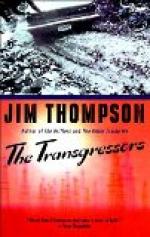Besides giving him distinction as a “corporation lawyer,” which has its effect in drawing outside clients, this proximity to the general offices of the Coal Barons’ syndicate relieves the young lawyer from the payment of rent. For the convenience of having a shrewd attorney always at his beck and call, Gorman Purdy, president of the company, is willing that Trueman shall occupy the office rent free in addition to the liberal salary which is paid him.
While Trueman is successfully managing the legal affairs of the Paradise Coal Company and achieving a brilliant reputation at the bar of Pennsylvania, Gorman Purdy is “trying him out” with an entirely different object in view. He desires to test the young man’s mettle as a man even more than as a lawyer. To accomplish this end it is most important that Trueman shall occupy the office next the suite of the great coal corporation.
Lying on the lawyer’s desk is an open envelope, by the side of which is a check for one thousand dollars, being the amount of his salary from the coal company for two months. In his ears still ring the plaintive sobs of the Magyar’s widow and the denunciation of O’Connor.
“The mine boss will put her in the street!”
In his mind’s eye he pictures the dusty road separating the two rows of miners’ huts, down around the bend in the Susquehanna. He sees the mountain beyond and the column of steam rising from a more distant breaker, half way up the slope—a beautiful vision from the distance, but how squalid in its dull gray misery to those who spend their lives in its midst.
At this moment the miners who were in attendance at court are trudging along this highway, chattering their grievances to one another. The widow and her boy bring up the rear, while the men march solemnly on ahead, talking of their right to live—just to live.
Across these mountains, in the city of Philadelphia, six score years and more ago a convention once uttered the identical sentiments being voiced by these serfs of the coal seams. Harvey Trueman has been a deep student of the teachings of that convention. On the shelves of his library are the well-thumbed writings of Washington and the Adamses and Thomas Jefferson. He is a firm believer of the doctrines enunciated at Faneuil Hall, and by Henry in Virginia.
To-morrow, perhaps to-night, the widow’s paltry chattels will be set in the middle of that road by the sheriff. She will be dispossessed by the Paradise Coal Company. A frail woman, pale with poverty of the blood, shrinking with every breath she draws, because she knows the very air she breathes comes to her over the lands of the Coal Barons—a haggard widow of the mines will be deprived of her miserable shelter, not fit for a beast of burden, by the richest coal corporation on earth. Why? Because her abject misery is a lesson too graphic in its horrible details to be constantly before the miners. Allowed to remain there, the widow will breed trouble




